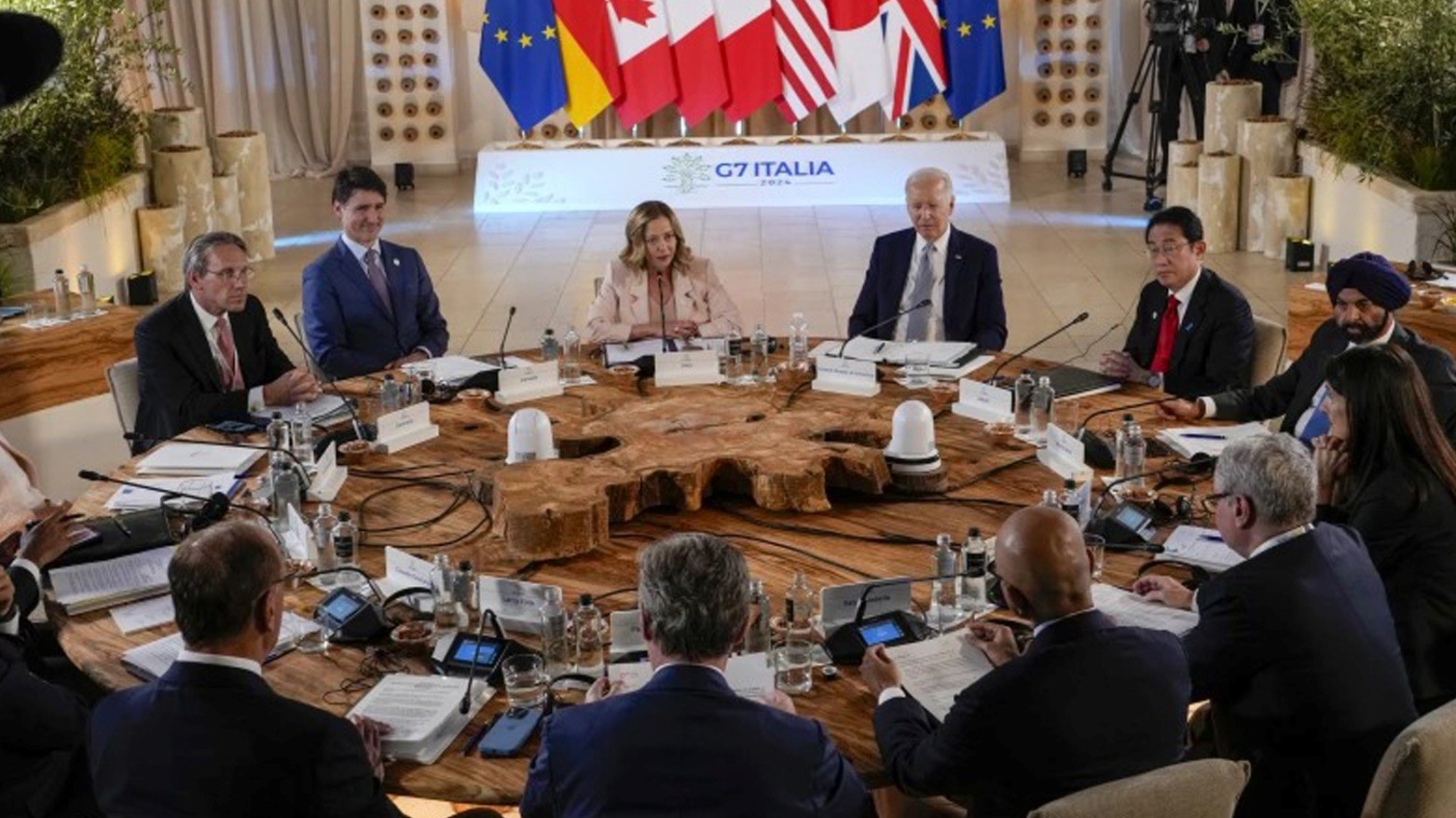U.S. Hails G-7 Condemnation of Iran
The U.S. welcomes “the G7 speaking with one united voice about the threat that Iran poses and the threat that its destabilizing activities pose.”

WASHINGTON DC, United States (Kurdistan 24) – State Department Spokesperson Matthew Miller, briefing journalists on Monday, expressed Washington’s warm welcome of the strong criticism of Iran expressed by the G-7 summit, when its leaders met last week in Italy.
The G-7 consists of seven advanced democracies: Canada, France, Germany, Italy, Japan, the U.K., and the U.S., plus the European Union (EU.) A number of those parties, including the EU, had long seen Iran in a far more benign light than the U.S.
But that changed significantly with the release of the G-7 leaders’ final communique on Friday. It contained language highly critical of Iran, unprecedented in its toughness for a number of those countries.
Growing International Criticism of Iran
Asked by Kurdistan 24 about that critical language. Miller responded that there was increasing international criticism of Iran, “not just with our G7 partners, but with other countries around the world.”
He also explained that the U.S. welcomed “the G7 speaking with one united voice about the threat that Iran poses and the threat that its destabilizing activities pose.”
INSERT VIDEO: https://www.youtube.com/watch?v=lco0YxOQdMs
The section in the G-7 communique dealing with Iran, began with its nuclear program: “We reiterate our determination that [Iran] must never develop or acquire a nuclear weapon.”
“We urge Tehran to cease and reverse [its] nuclear escalation, and stop the continuing uranium enrichment activities that have no credible civilian justification,” the communique stated, as it called on Iran to cooperate “with the IAEA’s [International Atomic Energy Agency’s] monitoring and verification mechanism.”
The communique then turned to Iran’s support for Russia in its war of aggression against Ukraine. For the EU itself and for several European countries, Tehran’s support for Moscow, including its supply of explosive drones to Russia, was probably the decisive factor in leading them to adopt a much tougher stance toward Iran.
“We call on Iran to stop assisting Russia’s war in Ukraine and not to transfer ballistic missiles and related technology,” the G-7 leaders said.
They warned that such steps “would represent a substantive material escalation and a direct threat to European security,” and “we are prepared to respond in a swift and coordinated manner.”
The communique’s third criticism of Iran involved the Middle East. “We demand that Iran cease its malicious activities and destabilizing actions in the Middle East, and we stand ready to adopt further sanctions or take other measures in response to further destabilizing initiatives,” it said.
And it added, "We continue to call for the immediate release of the MSC Aries, its remaining crew, and cargo.”
The ship became entangled in the conflict between Israel and Iran. On April 13. Iran’s Islamic Revolutionary Guard Corps (IRGC) seized the Portuguese-registered vessel in international waters, in the Strait of Hormuz, near the United Arab Emirates.
On April 1, Israel had bombed the Iranian consulate in Damascus, killing a senior IRGC Quds Force commander, Tehran vowed revenge and less than two weeks later, on April 13, it launched a series of retaliatory strikes, almost all of which targeted Israel, but which did little damage, because the Israel has a very effective air defense system.
However, the seizure of the ship, which Tehran claimed was Israeli-owned, was part of Iran’s retaliation.
Finally, the G-7 communique lambasted Iran’s human rights record. “We reiterate our deep concern over Iran’s human rights violations, especially against women, girls, and minority groups.”
“We call on Iran’s leadership to end all unjust and arbitrary detentions,” the G-7 leaders said.
U.S. Avoids Disputes with Iraqi Leadership
Although Miller was quite strong in his criticism of Iran, he sought to avoid quarreling with the Iraqi leadership, even when it expressed decidedly pro-Iranian views.
On Thursday, Amb. Tracy Jacobson, President Joe Biden’s nominee to be the next U.S. ambassador to Iraq, testified before the Senate Foreign Relations Committee, as part of the confirmation process for her new post.
She spoke strongly against the pro-Iranian militias in Iraq, describing them as the “primary threat” to the country.
Her testimony prompted strong criticism from Khalid al-Yaqoubi, Advisor to the Prime Minister for Security Affairs. Yaqoubi bristled at Jacobson’s criticism of Iran.
As the Iraqi paper, Shafaq News, reported, Yaqoubi complained that her testimony “showed a clear lack of understanding” of Iraq. It constituted “interference in [Iraq’s] internal affairs” and was an “offense to its neighbors.”
Asked for a response to those remarks, Miller demurred, saying only that Biden “has put forward a very capable, qualified nominee for ambassador to Iraq, and we urge a swift confirmation” from the U.S. Senate.